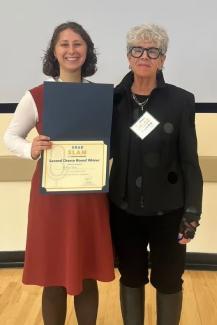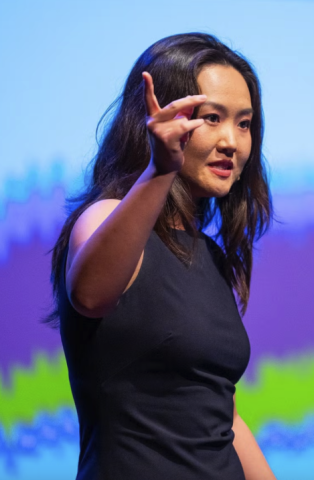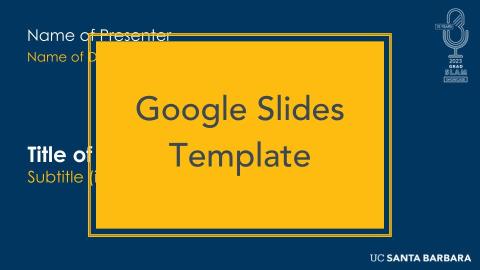General
Presenters
Eligibility: All graduate students currently enrolled in UCSB Master’s or Doctoral graduate programs are eligible to participate.
Collaboration: In cases of collaborative research, the presenter’s individual contribution to the project must be salient and clearly specified.
Publicity Permissions
By signing up, presenters agree to allow the UCSB Graduate Division to use their photos and videos for publicity surrounding the contest and/or in other contexts, such as promotional materials, website, etc.

Michaela Sten (left) and
Interim Dean Leila Rupp (right)
Visuals
While presenters are not directly evaluated on their visuals in the Grad Slam rubric, a slide can help enhance or clarify key aspects of their research. All UC Santa Barbara participants of the Grad Slam competition must adhere to the following slide requirements:
- Format: All presentations must be submitted in Google Slides format and emailed to gsrc@graddiv.ucsb.edu on February 13, 2026. Slides submitted in any other format will be returned, and no additional time will be granted for revisions.
- Number of Slides: Participants may submit one static slide only. Animations, transitions, embedded media, and sound are not permitted.
- Title Slide: The Professional Development team will create a standardized title slide for each participant. This slide will include the presenter’s name, talk title, subtitle (if applicable), and department.
- Optional Slide Submission: Presenters may choose not to submit a slide. In this case, the title slide will remain visible throughout the entirety of their talk.
- Slide Transition: For those who submit a slide, the Professional Development team will automatically transition from the title slide to the participant’s slide at the start of their presentation.
- Originality: All slides must be the presenter’s own work and may not be professionally designed.
- Use of Visuals: Photos, graphics, and charts are permitted, but must be properly cited or attributed on the slide. Any media generated using artificial intelligence tools must be cited, including the specific platform used (Gemini, ChatGPT, Claude, etc.).
- Support Materials: Participants are welcome to design their slide independently. An optional template is provided by the Professional Development team, and students may also consult the UC Santa Barbara visual identity guidelines for assistance.
Timing
Below are the timing parameters for the UC Santa Barbara Grad Slam competition:
- Presentations must be no longer than three minutes in total length.
- The official timer begins at the moment the presenter starts speaking.
- During the Preliminary Rounds, a Graduate Division staff member will be seated nearby with a visible timer that presenters may reference throughout their talk. The Presenter Coordinator will point out the timer during check-in.
- No additional timing cues will be given or permitted during the presentation.
- Presentations that exceed the three-minute limit will incur point deductions from the final score as follows:
- 3:03-3:04 - 1 point deducted
- 3:05-3:06 - 2 points deducted
- 3:07-3:08 - 3 points deducted
- 3:09-3:10 - 4 points deducted
- 3:11-3:12 - 5 points deducted
- Deductions will continue in two-second increments.

Yuting Ma at the 2025 Grad Slam Final Round
Judging & Scoring
Judging for the Preliminary, Second Chance, and Final Rounds will take place live and in person. Scores will be tabulated at the event, and winners will be announced by the emcee.
To ensure a diversity of perspectives, all judging panels will include a balanced mix of faculty, staff, graduate and undergraduate students, and community members. Judges are carefully selected to represent a range of disciplinary and professional backgrounds, and every effort will be made to avoid potential conflicts of interest.
Judges will evaluate presentations based on four key criteria:
- Accessibility: The presenter translated their research and its disciplinary significance into language that all audiences can understand.
- Example: The presenter used clear, straightforward language and avoided unnecessary jargon, making the talk broadly understandable. They also incorporated a simple comparison to illustrate a key idea, helping the audience connect unfamiliar concepts to something more familiar.
- Organization: The presenter delivered a talk that followed a clear and logical sequence.
- Example: The presentation followed a logical arc: introducing the research question, summarizing the methods, presenting key findings, and ending with a concise takeaway. Each section connected smoothly, making the talk easy to follow.
- Delivery: The presenter used an effective performance style, including appropriate body language, eye contact, expression, volume, and pace.
- Example: The presenter maintained steady eye contact, used open body language, and spoke with clear pacing and confident volume. Their gestures emphasized key points without distracting from the talk, creating a polished and professional performance.
- Engagement: The presenter conveyed enthusiasm for their research and successfully captured and maintained the audience’s attention.
- Example: The presenter conveyed genuine enthusiasm for their work, using vivid examples and dynamic energy to draw the audience in. Their storytelling approach kept listeners attentive and invested from start to finish.
Additionally, there is space at the bottom of the scorecard for judges to enter their written feedback for presenters as well. This feedback, along with the scores, will be compiled and shared anonymously with students via email after the round.
